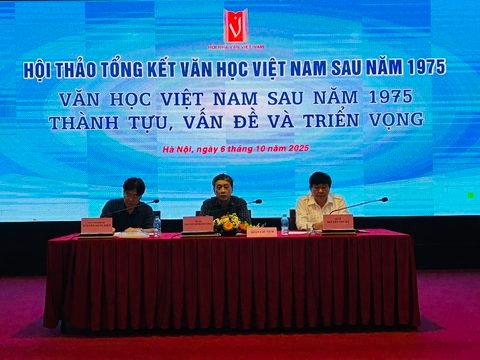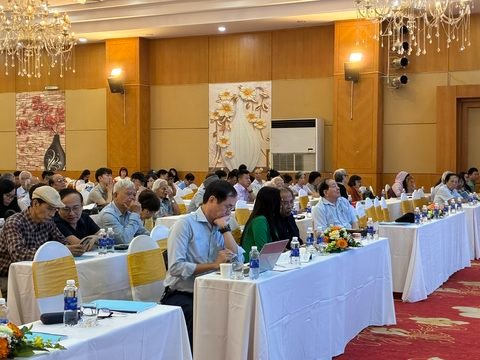The Vietnam Writers’ Association held a national seminar in Hanoi on October 6, titled “Vietnamese Literature After 1975: Achievements, Challenges, and Prospects.”
The Vietnam Writers’ Association held a national seminar in Hanoi on October 6, titled “Vietnamese Literature After 1975: Achievements, Challenges, and Prospects.”
Poet Nguyen Quang Thieu, Chairman of the association, reflected that the past 50 years have been a defining era for Vietnamese literature, rich in achievements yet full of challenges.
He noted that since 1975, especially after Doi moi (Renewal), Vietnamese literature has undergone profound transformation, marked by new aesthetic trends and schools of thought that have revitalized prose, poetry, criticism, and translation.

Associate Professor, Dr. Nguyen The Ky, Former member of the Party Central Committee, Vice Chairman of the Central Theoretical Council; writer and Colonel Nguyen Binh Phuong, Vice Chairman of the Vietnam Writers Association; and Associate Professor Dr. Nguyen Dang Diep, literary critic.
In the digital age, Thieu cautioned about the rise of artificial intelligence (AI) in creative writing.
“Some writers have already become robots of their own making, trapped by safe formulas,” he said, emphasizing that creativity and emotional depth are the only weapons against AI’s encroachment.
Writer and Colonel Nguyen Binh Phuong, Editor-in-Chief of the Military Literature Magazine, Vice Chairman of the association, observed that 50 years is brief in human history but significant for a nation’s literature.

The seminar gathers more than 100 writers and literary researchers from across the country.
He summarized differing opinions gathered from earlier seminars in Ho Chi Minh City and Danang, some praised literature’s role in healing postwar wounds, while others criticized it for avoiding hard truths and failing to shape society’s moral vision.
Professor Phong Le highlighted the need for generational transition, stressing that the future of Vietnamese literature lies with young writers born around the 1990s, who will define its next era.
Other papers presented included “The Literary Innovation of 1975-2025” by poet Tran Anh Thai, “The Mission of National Reconciliation and Harmony 50 Years After the War” by writer Nguyen Viet Chien, and “Generations of Vietnamese Writers Abroad Since 1975” by Nguyen Hoai Nam.
Translated by DO HUONG